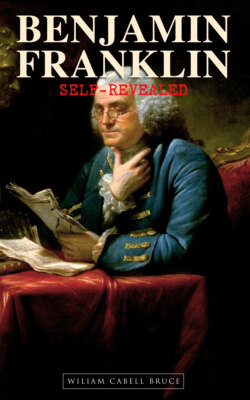Читать книгу Benjamin Franklin, Self-Revealed - Wiliam Cabell Bruce - Страница 8
На сайте Литреса книга снята с продажи.
FOOTNOTES:
Оглавление[1] The superlative eulogy of Franklin is that of Josiah Quincy, Junior, who expressed his conviction in his journal that Franklin was one of the wisest and best of men upon earth; one, of whom it might be said that this world was not worthy. Of course, no man capable of creating such a conviction as this was safe from "the wolf's black jaw and the dull ass' hoof." Capefigue in his Memoirs of Louis XVI. called Franklin "one of the great charlatans" of his age. This is the language of a man who finds a phrase and thinks he has found a fact. Arthur Lee said on one occasion that Franklin was "the meanest of all mean men, the most corrupt of all corrupt men"; but this was merely the froth of a rabid mental condition. Stephen Sayre wrote to Capellen that Franklin was a "great villain," but Sayre had unsuccessfully solicited office from Franklin. Besides, this extraordinary character seems to have nearly, if not quite, answered Franklin's description of a man who has neither good sense enough to be an honest man nor wit enough for a rogue. The only one of Franklin's slanderers whose arrow hit anywhere near the mark was an anonymous French poet who termed him "Caméléon Octogénaire."
[2] Franklin was as fearless in applying his ethical principles to himself as to others. After telling his sister Jane in a letter, dated Dec. 30, 1770, that he trusted that no apprehension of removal from his office as Postmaster would make the least alteration in his political conduct, he uses these striking words: "My rule, in which I have always found satisfaction, is, never to turn aside in public affairs through views of private interest; but to go straight forward in doing what appears to me right at the time, leaving the consequences with Providence. What in my younger days enabled me more easily to walk upright, was, that I had a trade, and that I knew I could live upon little; and thence (never having had views of making a fortune) I was free from avarice, and contented with the plentiful supplies my business afforded me. And now it is still more easy for me to preserve my freedom and integrity, when I consider that I am almost at the end of my journey, and therefore need less to complete the expense of it; and that what I now possess, through the blessing of God, may, with tolerable economy, be sufficient for me (great misfortunes excepted), though I should add nothing more to it by any office or employment whatsoever."
[3] In a paper on William Franklin, read before the New Jersey Historical Society on Sept. 27, 1848, William A. Whitehead sketches him in this manner: "He was of a cheerful, facetious disposition; could narrate well entertaining stories to please his friends; was engaging in his manners, and possessed good conversational powers. He lived in the recollection of those who saw him in New Jersey as a man of strong passions, fond of convivial pleasures, well versed in the ways of the world, and, at one period of his life not a stranger to the gallantries which so frequently marred the character of the man of that age. He was above the common size, remarkably handsome, strong and athletic, though subject to gout towards the close of his life." His writings, Whitehead thought, though perhaps less remarkable than might be expected from his advantages of education and association, gave evidence of literary attainments which compared favorably with those of most of the prominent men of that day in the Colonies. If The Historical Review of the Constitution and Government of Pennsylvania from its Origin is one of them, as has been supposed, we can only say that it at least hardly deserves such praise. The unassimilated material scattered through its pages reminds us of nothing so much as feather pellets and fragments of bone that have passed unchanged through the gastric tract of a hawk.
[4] The judgment of Franklin himself as to how far his life had been a fortunate one was freely expressed in a letter to his friend John Sargent, dated Jan. 27, 1783. "Mrs. Sargent and the good Lady, her Mother," he said, "are very kind in wishing me more happy Years. I ought to be satisfy'd with those Providence has already been pleas'd to afford me, being now in my seventy-eighth; a long Life to pass without any uncommon Misfortune, the greater part of it in Health and Vigor of Mind and Body, near Fifty Years of it in continu'd Possession of the Confidence of my Country, in public Employments, and enjoying the Esteem and affectionate, friendly Regard of many wise and good Men and Women, in every Country where I have resided. For these Mercies and Blessings I desire to be thankful to God, whose Protection I have hitherto had, and I hope for its Continuance to the End, which now cannot be far distant."
[5] For instance, in a letter to Elizabeth Partridge Franklin signs himself "Your affectionate Papah," and in a letter to Madam Conway, "Your affectionate Father (as you do me the Honor to call me)," and in a letter to Miss Flainville, "Your loving Papa."
[6] In a letter from Paris to Jan Ingenhousz, dated Apr. 26, 1777, Franklin told Ingenhousz that he had brought Temple with him from America "partly to finish his Education, having a great Affection for him, and partly to have his Assistance as a Secretary."
